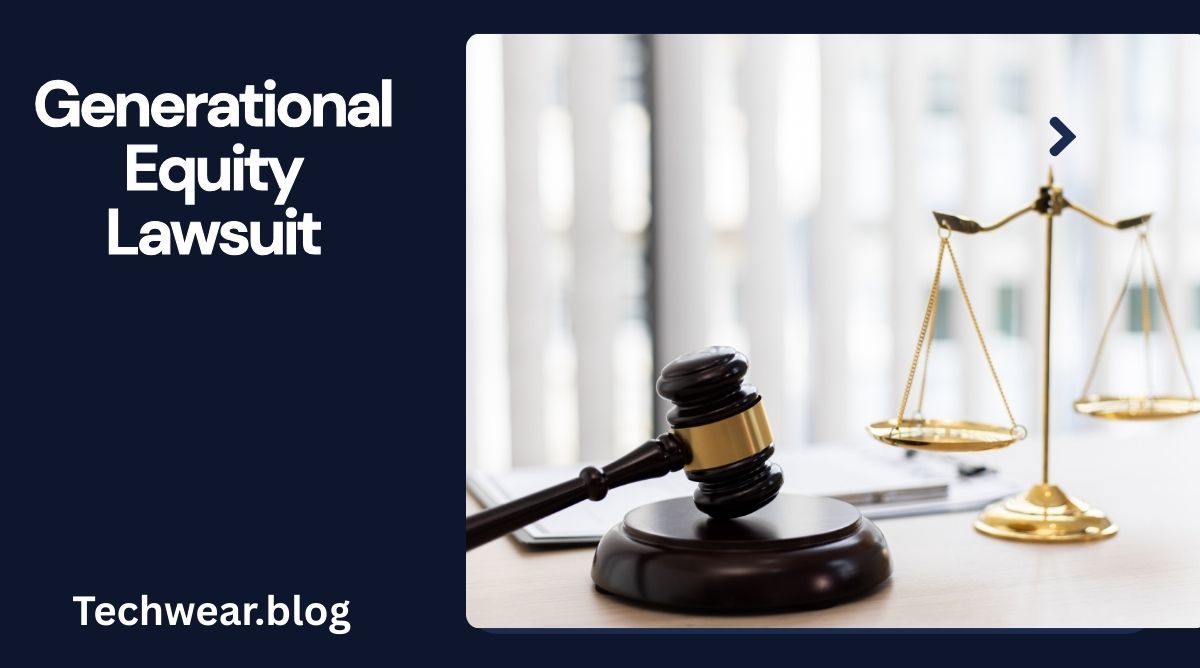When discussing generational equity lawsuit, it is important to understand both the term generational equity and how it connects with the legal world. Generational equity refers to the fairness and balance between different age groups, especially when it comes to resources, rights, and opportunities. A lawsuit that involves this principle is usually aimed at ensuring that the needs of one generation are not met at the unfair expense of another.
This article will break down the meaning of generational equity, the context in which lawsuits can arise, famous cases around the world, and the potential implications for the future.
What Is Generational Equity?
Generational equity is a concept that emphasizes fairness between younger, older, and future generations. It is a principle often discussed in economics, politics, and social sciences. At its core, it is about ensuring that no generation consumes resources, creates debt, or causes harm in a way that disproportionately burdens future generations.
You can learn more about the idea of equity from the Equity (economics) page on Wikipedia, which explains fairness in resource distribution.
How Generational Equity Leads to Lawsuits
A generational equity lawsuit occurs when one group—often younger generations or their representatives—files a case against governments, institutions, or corporations, claiming that current policies or actions are unfair to their generation or future generations.
These lawsuits often arise in three main areas:
- Environmental Law – Younger generations sue governments or industries for environmental damage that threatens their future.
- Economic Policies – Legal actions challenge pension systems, national debt policies, or taxation that disproportionately benefit older generations while burdening younger ones.
- Social Rights – Some lawsuits argue that laws favoring one generation undermine opportunities for others, such as access to housing, jobs, or healthcare.
Generational Equity in Climate Change Lawsuits
One of the most common areas where generational equity lawsuits appear is climate change litigation. Youth activists worldwide have turned to courts, arguing that governments are failing to protect their future by allowing unsustainable levels of pollution and resource consumption.
Examples include:
- Juliana v. United States – A famous lawsuit filed by young Americans against the U.S. government, claiming that government policies violated their constitutional rights to life and liberty by worsening climate change.
- Urgenda Foundation v. State of the Netherlands – A Dutch court ordered the government to reduce greenhouse gas emissions, recognizing the duty to protect future citizens.
These cases highlight how the principle of generational equity is applied legally, ensuring younger generations are not left with the consequences of climate inaction.
For more context on legal frameworks, you can refer to Environmental law on Wikipedia.
Economic and Pension-Related Generational Equity Lawsuits
Apart from climate issues, lawsuits also occur in the economic sector. Many pension systems, especially in developed nations, are funded by younger workers’ contributions but heavily benefit retirees. When these systems become financially unsustainable, younger generations may argue that they are unfairly burdened.
Generational equity lawsuits in this context might involve:
- Challenging pension reforms that increase taxes on younger workers while protecting benefits for retirees.
- Lawsuits over public debt, arguing that government borrowing shifts financial responsibility to future generations.
- Legal action against housing or labor policies that favor older citizens at the expense of younger ones.
The principle of intergenerational equity is central to these cases, as it examines fairness across generations in both economic and environmental contexts.
Generational Equity in Education and Healthcare
Generational equity lawsuits can also emerge in areas such as education funding and healthcare policies. For example:
- If governments underfund education while heavily subsidizing senior healthcare, younger citizens may argue that their opportunities are being restricted.
- If student loan systems become overwhelmingly burdensome, lawsuits could argue that the debt unfairly limits the financial freedom of younger generations.
These types of cases show that generational equity extends beyond climate and economics into nearly every aspect of public policy.
Ethical and Legal Challenges
Generational equity lawsuits raise several complex legal and ethical questions:
- Standing – Can younger generations or even unborn generations have the legal right to sue?
- Responsibility – Who is legally responsible: governments, corporations, or both?
- Measurability – How can courts measure fairness between generations, especially when predicting the future is uncertain?
Courts worldwide have dealt with these challenges differently, but the trend shows an increasing recognition that generational fairness is a legitimate legal concern.
Notable Global Examples of Generational Equity Lawsuits
Here are some well-known cases that demonstrate how generational equity lawsuits function:
- Juliana v. United States (2015) – Youth plaintiffs argued the U.S. government violated their rights by promoting fossil fuel use.
- Leghari v. Federation of Pakistan (2015) – A Pakistani farmer successfully sued the government for failing to implement climate policies, highlighting future generational impacts.
- Swiss Senior Women v. Swiss Government (2020s) – Though led by seniors, this case argued government inaction on climate would harm younger and future generations.
These examples show that lawsuits can be initiated by both young people and older generations who care about fairness for the future.
The Future of Generational Equity Lawsuits
As global awareness of intergenerational equity grows, more lawsuits are expected. Climate change, national debt, healthcare funding, and pension reforms will likely be central to future cases.
We may also see:
- Technology-related lawsuits – Addressing issues like AI ethics or genetic engineering, where decisions today could affect future generations.
- Resource allocation cases – Especially in regions where water, land, or energy resources are dwindling.
- Constitutional amendments – Some nations may add generational equity principles into their constitutions to prevent unfair treatment across age groups.
Why Generational Equity Lawsuits Matter
The importance of generational equity lawsuits lies in their ability to:
- Protect future generations from harmful policies.
- Encourage sustainable governance, where decisions account for long-term consequences.
- Raise awareness about the interconnectedness of social, economic, and environmental justice.
Ultimately, these lawsuits push societies to think beyond short-term gains and ensure fairness across time.
Conclusion
A generational equity lawsuit is more than just a legal case—it is a moral and social statement. It reflects the demand for fairness between present and future generations in areas such as climate change, economics, healthcare, and education.
By challenging unfair systems through courts, these lawsuits highlight the urgent need for sustainable and just policies. As the world continues to face crises that span decades, generational equity lawsuits will only grow more relevant.
To dive deeper into this subject, you can explore the concept of Intergenerational equity, which forms the foundation for these legal battles.






